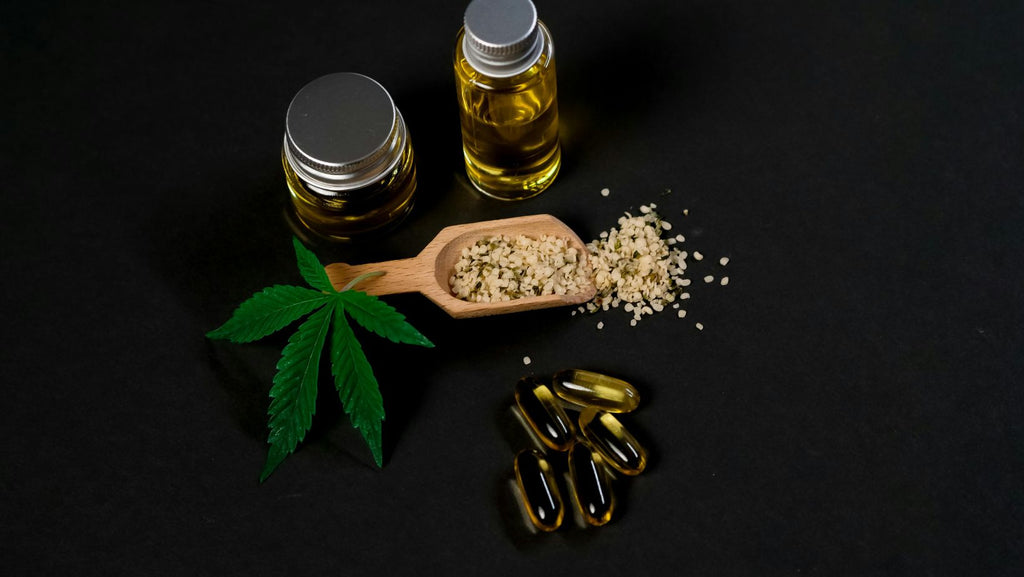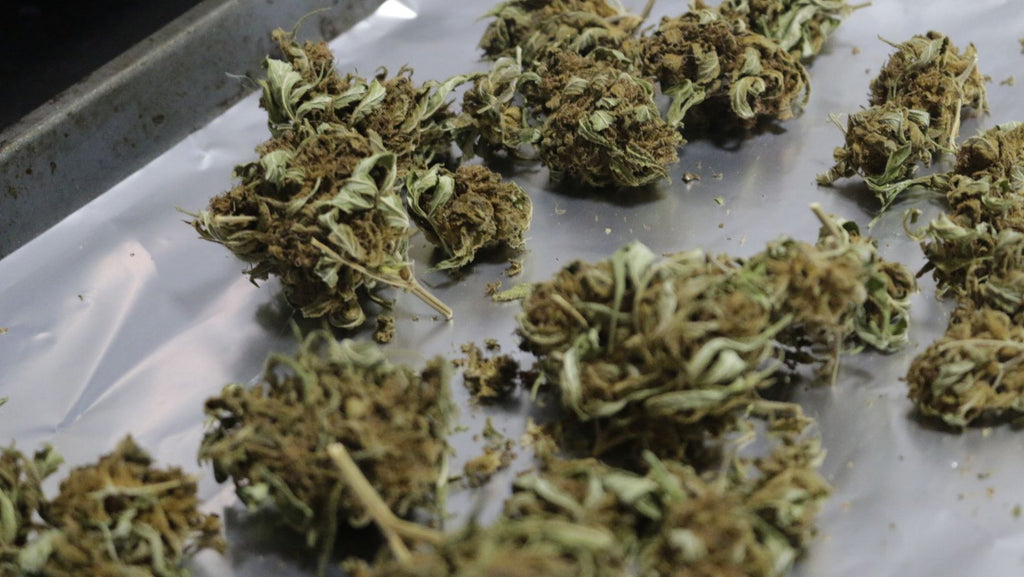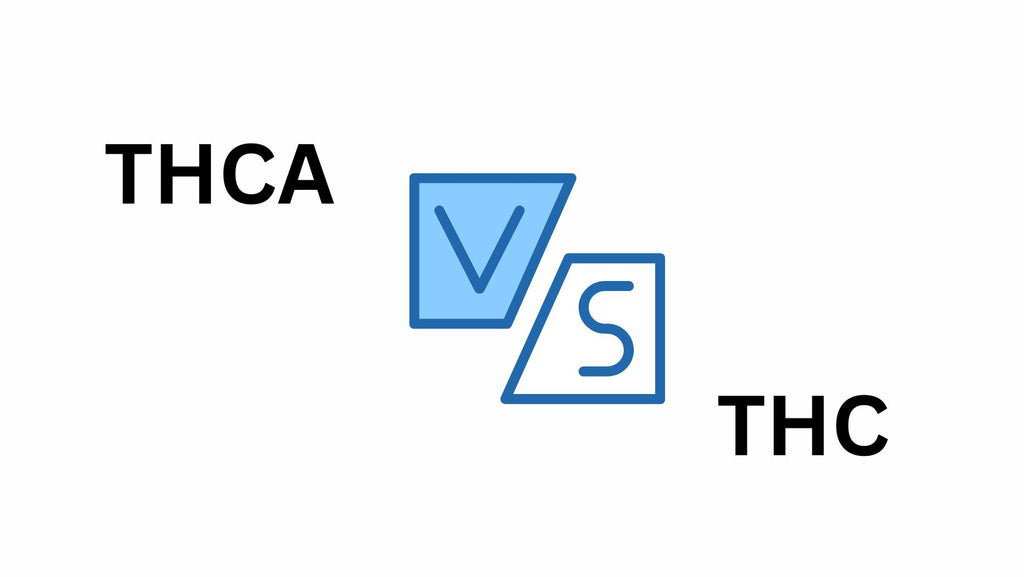Does THCA Get You High? Everything You Need
Share
Explore the truth: Does THCA get you high? Uncover the facts, effects, and much more in this detailed guide. Try our THCA pre rolls here.
Does THCA Get You High? Breaking Down the Truth
When exploring the components of cannabis, THCA is one compound that often sparks curiosity. Tetrahydrocannabinolic acid (THCA) is a non-psychoactive precursor found in the raw cannabis plant. Its potential effects and transformation into THC upon heating (decarboxylation) raise important questions about its ability to cause a high.

In this blog, we will delve into the nature of THCA, addressing common misconceptions and providing a clear understanding of its effects on the human body. Whether you are a medical user, a recreational consumer, or simply curious about cannabis science, understanding THCA is crucial for anyone looking to explore beyond the surface of common cannabis products.
What is THCA? Does It Really Cause a High?
THCA stands for tetrahydrocannabinolic acid, which is found naturally in fresh, undried cannabis plants. Unlike its well-known counterpart, THC (tetrahydrocannabinol), THCA is non-psychoactive, which means it doesn't produce the euphoric high associated with THC.
This is because the molecular structure of THCA does not allow it to bind effectively with CB1 receptors in the brain, which are responsible for the psychoactive effects of cannabis.

The transformation of THCA into THC occurs through a process known as decarboxylation, where heat removes a carboxyl group from THCA, converting it into THC. This can happen naturally over time as cannabis dries and ages or more quickly when cannabis is heated during smoking, vaping, or cooking.
Therefore, while THCA itself does not cause a high, its potential to convert into THC when exposed to heat means that the method of consumption can activate its psychoactive effects. Understanding this distinction is key for consumers who are looking for specific benefits from their cannabis products, such as those seeking relief without psychoactive effects.
How Long Does THCA Stay in Your System?
Determining how long THCA remains in your system can be complex because it largely depends on several factors including the frequency of use, the method of consumption, and individual metabolism rates.
Unlike THC, which is well-studied regarding how long it stays detectable in the body, less is known specifically about THCA, particularly because it does not produce psychoactive effects and is less commonly tested for in standard drug tests.

When THCA does convert to THC—through decarboxylation—the longevity of its detectability depends on the converted THC rather than THCA itself. THC can linger in your system and can be detected in bodily fluids and hair follicles for varying durations:
- Urine: THC can be detectable in urine for 3 days after single use to over 30 days for heavy use.
- Blood: THC is detectable in blood for up to 36 hours.
- Saliva: In saliva, THC can be detected from 1 to 3 days.
- Hair: Hair tests show THC for up to 90 days.
These timelines reflect THC’s presence, which can be indicative of the way the body processes THCA post-conversion. Understanding these aspects is crucial for users who are concerned about drug testing or are monitoring their cannabinoid intake for medical purposes.
The Science Behind THCA: Can It Make You High?
THCA, or tetrahydrocannabinolic acid, is a non-psychoactive cannabinoid that naturally occurs in the cannabis plant. By itself, THCA does not produce a high because it does not readily bind to the CB1 cannabinoid receptors in the brain, which are responsible for the psychoactive effects of THC.
However, when THCA is heated, it converts to THC, a process known as decarboxylation, which can induce psychoactive effects.
The science of how THCA transforms into THC and interacts with the body is critical for users and medical professionals to understand:
- Decarboxylation: Heating THCA removes a carboxyl group, converting it into psychoactive THC.
- Activation of Effects: Only after conversion does it have the potential to bind effectively with brain receptors and produce a high.
- Consumption Methods: How THCA is consumed (raw, heated, aged) greatly affects its conversion rate to THC.
- Medical Use: THCA is studied for its potential anti-inflammatory, neuroprotective, and anti-emetic properties, independent of its conversion to THC.
- Legality and Testing: Understanding that THCA converts to THC can impact legal implications and drug testing results.
What Are The Different Ways To Decarboxylate THCA?
Decarboxylation is a critical process for activating the psychoactive potential of THCA, the non-psychoactive precursor found in raw cannabis plants. This chemical reaction involves applying heat to cannabis, which transforms THCA into the intoxicating THC.
Understanding the different methods to decarboxylate THCA can help users tailor their cannabis experience, whether they are looking to create potent edibles, tinctures, or simply want to ensure maximum effectiveness when consuming cannabis.

There are several methods to decarboxylate THCA, each suitable for different uses and preferences:
- Oven Decarboxylation: Perhaps the most common method, involving grinding cannabis and evenly spreading it on a baking sheet, then heating it in an oven at 220-245°F (104-118°C) for 30-45 minutes.
- Boiling in Water: Cannabis can be sealed in a waterproof bag and boiled. Water boils at 212°F (100°C), a temperature that can slowly decarboxylate the cannabis over a longer period, typically a few hours.
- Slow Cooker Oil or Butter Infusion: Mixing cannabis with butter or oil and heating it in a slow cooker at a low heat for several hours effectively decarboxylates THCA without burning the material.
- Microwave: A quicker, although less precise, method involves placing dried cannabis in a microwave and heating it in short bursts until it’s decarboxylated.
- Sun Drying: Exposing cannabis to the sun over an extended period can naturally decarboxylate THCA, although this is less reliable and weather-dependent.
Understanding these various methods allows consumers to effectively activate THCA in their cannabis, optimizing its benefits and the efficiency of its use in various cannabis-infused products.
Exploring the Effects of THCA: What You Need to Know About Its High
THCA, or tetrahydrocannabinolic acid, is commonly misunderstood due to its non-psychoactive properties in its natural state. THCA is the precursor to THC, the main intoxicating component in cannabis that produces the "high" most users are familiar with.
In its raw form, THCA has no psychoactive effects because it does not effectively bind to CB1 receptors in the brain. However, when THCA is heated through smoking, vaping, cooking, or curing, it undergoes decarboxylation and transforms into THC.
The actual "high" from THCA comes only after this conversion, which means that the effects of THCA itself are primarily non-psychoactive. Instead, THCA has been researched for potential medicinal benefits, including anti-inflammatory and neuroprotective properties. While THCA itself does not induce a psychoactive high, it holds potential for various health benefits.

For those exploring alternatives to enhance sleep without the psychoactive effects of THC, products such as CBD sleep gummies and some other better sleep products could complement the use of THCA.
Additionally, sleep drops that contain CBD or other non-intoxicating cannabinoids can also be integrated into an evening routine to support deeper sleep, leveraging the anti-inflammatory properties of THCA to improve overall sleep quality.
What is a High THCA Percentage?
A high THCA percentage in cannabis refers to a significant concentration of tetrahydrocannabinolic acid in a given cannabis strain or product. This measurement is crucial for several reasons:
- Potency Potential: High THCA content indicates that the cannabis has a strong potential for psychoactivity once decarboxylated. More THCA means more THC potential, which translates to stronger effects after consumption.
- Product Labeling: Cannabis products, especially those sold in dispensaries, often list THCA percentages. This helps consumers gauge how potent the product might be once heated.
- Cultivation Insights: A high THCA percentage can also reflect the quality of the cannabis strain and the cultivation practices. High-quality, well-grown plants tend to produce more cannabinoids overall, including THCA.
- Medical Use: For medical marijuana patients, high THCA content might be desirable for preparing products that require decarboxylation at home, such as edibles or oils, ensuring they receive a sufficient THC dose for therapeutic effects.
THCA vs THC: Which High is Stronger?
When comparing THCA and THC, it's important to clarify the significant differences in how each affects the body, particularly concerning their psychoactive effects. THCA, or tetrahydrocannabinolic acid, is a non-psychoactive cannabinoid found in raw and live cannabis.
As discussed, THCA does not create a high unless it undergoes decarboxylation, a process in which it is exposed to heat and loses a CO2 molecule to become THC (tetrahydrocannabinol).THC is the main psychoactive component of cannabis, responsible for the high that users experience.
It interacts directly with the body's endocannabinoid system, particularly binding to the CB1 receptors in the brain, which leads to the feelings of euphoria, relaxation, altered sensory perception, and other cognitive changes associated with getting high.

In contrast, THCA has a different molecular structure that does not allow it to bind easily with CB1 receptors, hence it does not produce psychoactive effects unless converted to THC.
In terms of strength of the high, THC is undoubtedly the stronger of the two because THCA does not directly contribute to psychoactive effects. The process of converting THCA to THC, however, is crucial for users looking to experience the full psychoactive potential of their cannabis.
Understanding this conversion is key for both recreational users seeking certain effects and medical users needing specific therapeutic benefits.
Here’s a comparison table to succinctly illustrate the differences between THCA and THC:
|
Aspect |
THCA |
THC |
|
Psychoactivity |
Non-psychoactive unless decarboxylated |
Psychoactive |
|
Occurrence |
Found in raw cannabis |
Formed through decarboxylation |
|
Effects on Body |
No direct high, potential for non-psychoactive health benefits |
Causes euphoria, relaxation, altered perception |
|
Medical Use |
Anti-inflammatory, neuroprotective (preliminary studies) |
Pain relief, anti-nausea, appetite stimulant |
|
Legal Status |
Generally legal as it is non-psychoactive |
Varies by jurisdiction, generally regulated |
How Can You Consume THCA Without Getting High?
Consuming THCA without experiencing the psychoactive effects associated with THC involves avoiding the decarboxylation process, which transforms THCA into THC. This can be achieved by consuming cannabis in forms that do not involve heat:
- Juicing Raw Cannabis: One of the most popular methods to consume THCA without getting high is by juicing raw cannabis leaves and buds. This method ensures that the cannabis is never heated, thereby preserving the THCA in its natural state.
- Eating Raw Cannabis: Similar to juicing, eating raw cannabis buds and leaves can provide the benefits of THCA without psychoactivity. It can be incorporated into salads or simply chewed.
- THCA Tinctures: Some manufacturers offer tinctures that contain THCA, which are created using cold-extraction methods to avoid converting THCA into THC. These can be administered sublingually.
- THCA Crystals or Isolates: These are pure forms of THCA extracted from the cannabis plant without using heat. They can be consumed as they are or added to food.
Consuming THCA without experiencing a high is ideal for those looking to maintain clarity while managing symptoms like stress or fatigue. Alongside consuming raw cannabis, incorporating stress gummies and energy gummies which may contain THCA, can provide the benefits of cannabis without psychoactivity.

Moreover, using melatonin oil in conjunction with THCA at night can enhance the body's natural sleep cycle without the side effects associated with psychoactive cannabinoids.
Does THCA Show Up on a Drug Test?
THCA itself does not show up on most standard drug tests, which are designed to detect THC, the psychoactive cannabinoid that results from the decarboxylation of THCA. Standard drug tests typically look for THC metabolites, which are compounds produced when the body processes THC.
Since THCA is non-psychoactive and does not convert to THC unless heated, it generally does not produce the metabolites that drug tests look for.
However, consumers should be cautious for several reasons:
- Decarboxylation Can Occur Accidentally: If cannabis containing THCA is stored improperly or exposed to heat, some THCA may convert to THC, leading to possible detection on a drug test.
- Contamination with THC: In practical settings, cannabis products labeled as containing only THCA may also contain trace amounts of THC due to the manufacturing process or cross-contamination, which could potentially be detected by a drug test.
- Sensitive Tests: Some highly sensitive drug tests might indirectly detect high levels of THCA as an indication of cannabis use, although this is uncommon.
It’s crucial for individuals who are concerned about drug testing to understand these nuances and consider them when using products containing THCA, especially in environments that require regular drug screening.
Myth vs. Reality: The High of THCA Uncovered
When exploring the effects of THCA, it's important to distinguish between common misconceptions and the scientific realities. Here's a breakdown to clarify the myths and realities surrounding THCA:
Myth 1: THCA will get you high just like THC.
Reality: THCA is non-psychoactive, meaning it does not produce a high. The psychoactive effects associated with cannabis come from THC, not THCA. THCA only becomes psychoactive after it has been decarboxylated (heated) to convert it into THC.
Myth 2: Consuming raw cannabis can lead to intoxication.
Reality: Since raw cannabis contains primarily THCA, not THC, consuming it in its raw form will not induce the typical high associated with cannabis. Any effects felt are likely from minimal amounts of THC present, not THCA.
Myth 3: THCA has no health benefits since it isn’t psychoactive.
Reality: Despite its lack of psychoactivity, THCA has been shown to have potential health benefits, including anti-inflammatory and neuroprotective properties, making it of interest for medical research and applications.
Myth 4: THCA effects can be felt immediately after consumption.
Reality: Because THCA is non-psychoactive, its benefits are not immediately noticeable in the way THC's effects are. Any therapeutic benefits from THCA would accrue over time and with consistent use.
Myth 5: THCA can be detected in standard drug tests.
Reality: Standard drug tests are designed to detect THC, not THCA. While very sensitive tests might pick up traces of THCA, it is generally not what drug screenings are looking for.
Myth 6: All cannabis products contain high levels of THCA.
Reality: The levels of THCA in cannabis products vary widely depending on the strain and the cultivation and processing methods used. Some products, especially those intended for recreational use, are processed to maximize THC, not THCA.
Final Thoughts
As we explore the complexities of THCA and its role within the cannabis plant, it's clear that understanding this cannabinoid goes beyond simply acknowledging its non-psychoactive nature.
While it does not provide a high in its raw form, THCA holds significant potential for therapeutic benefits, which could play a crucial role in medical treatments and wellness practices.For those looking to utilize cannabis for its health benefits without experiencing psychoactive effects, THCA offers a promising avenue.
As research continues to evolve, the full spectrum of THCA's properties and benefits will likely be further illuminated, offering new opportunities for both medical and recreational users to harness the unique qualities of this cannabinoid.
FAQs
1. How long does it take for THCA to convert into THC when heated?
THCA begins converting into THC almost immediately upon heating, with significant conversion occurring within 30 to 45 minutes at typical decarboxylation temperatures.
2. Can THCA help with sleep?
While THCA itself is not sedative, its potential anti-inflammatory and pain-relieving properties might indirectly help improve sleep quality for some users.
3. Does THCA interact with CBD in any way?
THCA and CBD can coexist in the same cannabis product and may potentially offer synergistic effects, especially in reducing inflammation and managing pain, though more research is needed.
4. Is it possible to extract THCA from cannabis at home?
Yes, it is possible to extract THCA using alcohol or oil-based extraction methods at home, though care must be taken to avoid decarboxylation if the goal is to preserve THCA.
5. What forms of THCA are available on the market?
THCA is available in various forms including raw cannabis flowers, tinctures, topicals, and as isolated crystals or powders.
6. Are there any known drug interactions with THCA?
Specific interactions between THCA and pharmaceutical drugs are not well-documented; however, as with any supplement, it is advisable to consult with a healthcare provider before combining treatments.
7. Can pets safely consume THCA?
Some pet owners use THCA for its potential anti-inflammatory and pain-relief benefits in animals, but it should only be done under veterinary supervision to ensure safety and proper dosing.
8. How should THCA products be stored to maintain potency?
THCA products should be stored in a cool, dark place to prevent degradation. Airtight containers are recommended to protect against moisture and air exposure.
